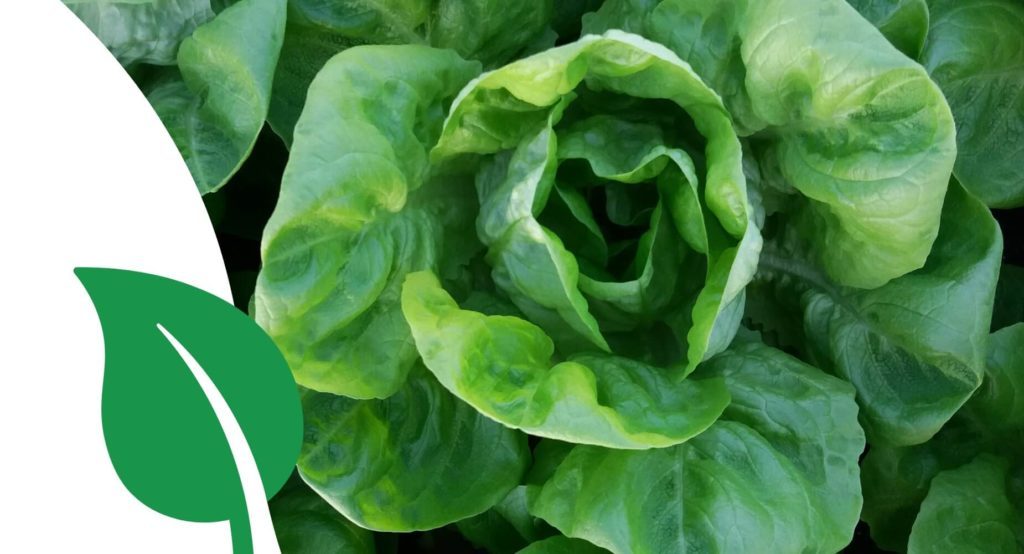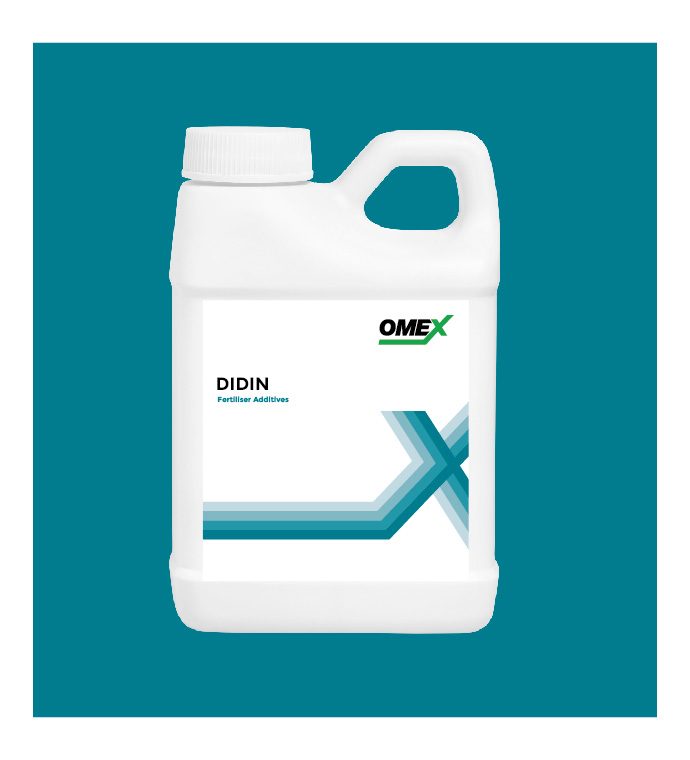
DIDIN®
DIDIN is a nitrification inhibitor for liquid fertiliser that offers farmers a variety of benefits:- Nitrification inhibitor
- Reduces carbon footprint
- Reduces nitrous oxide emissions
- Improves nitrogen use efficiency
- Improves yield
- Enables all nitrogen to be applied in one pass

What is DIDIN?
DIDIN is a nitrification inhibitor, created with NprotectioN technology, and has been part of the OMEX range for over 30 years. It’s an inorganic liquid formulation containing DCD, designed to improve Nitrogen Use Efficiency, reduce nitrous oxide emissions, allow the full seasons fertiliser application to be applied in a single pass and reduce the carbon footprint of fertiliser applied.
DIDIN works by safely protecting your valuable nitrogen liquid fertiliser application, delivering a steady supply of crop available nitrogen throughout the growing season, leading to higher yielding and higher quality crops. Utilising DIDIN means the crop can utilise more of the nitrogen applied, increasing Nitrogen Use Efficiency.
Expertly Formulated
DIDIN has been expertly formulated to offer farmers a variety of convenience, agronomic and sustainability benefits. It’s been rigorously tested to ensure it consistently delivers on Nitrogen Use Efficiency and is safe to use on soils. You can watch more about the benefits of DIDIN here!
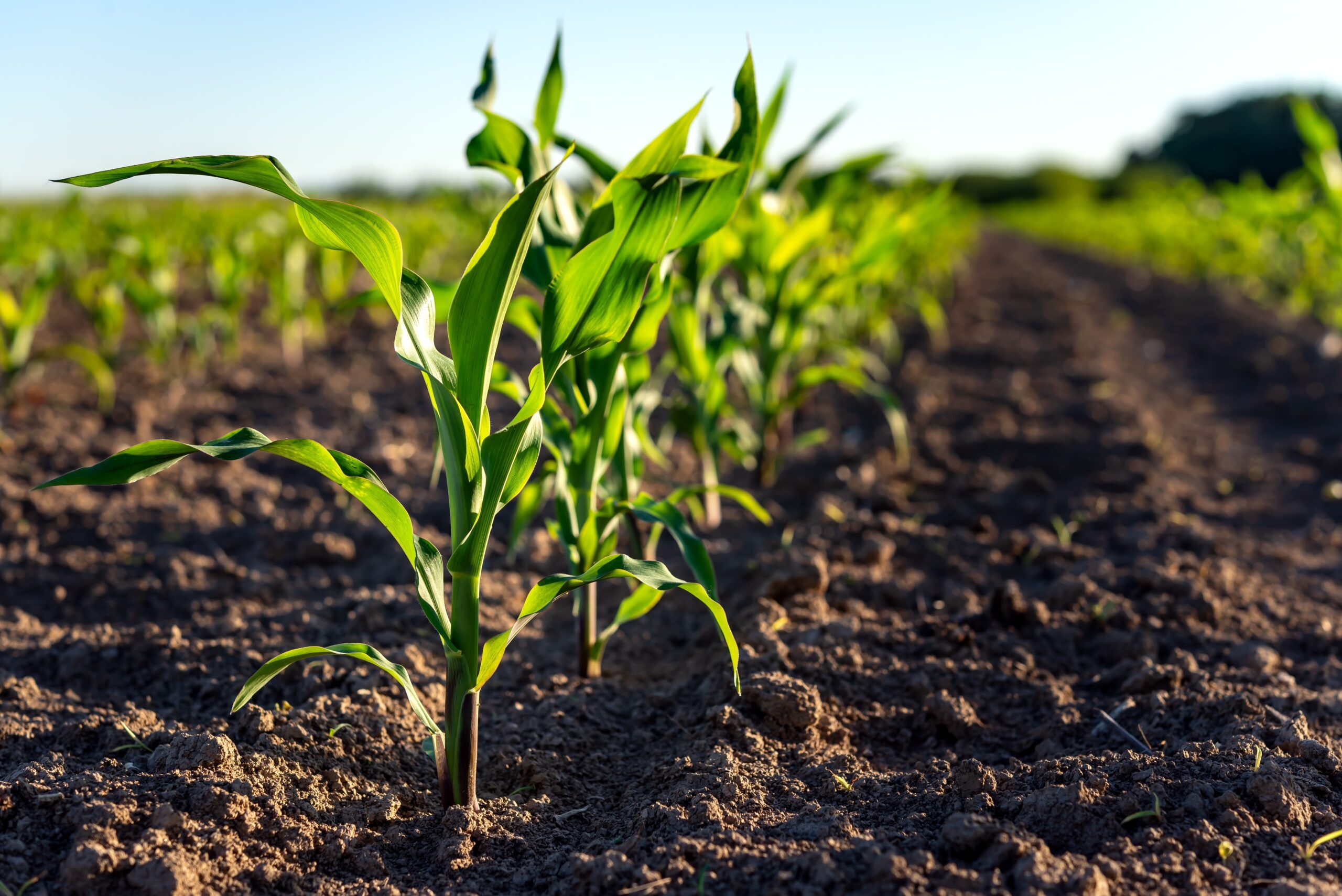

How does DIDIN work?
The bacteriostatic action of one of the nitrification inhibitors in DIDIN, dicyandiamide, works selectively on Nitrosomonas europeae controlling the oxidation of ammonium to nitrate. By keeping the nitrogen in the ammonium form which is less prone to leaching, nitrogen losses can be kept to a bare minimum.
Dicyandiamide is broken down as soil temperature increases. DIDIN therefore releases more nitrogen as the crop requires it. When applied with slurry in the winter months, DIDIN can stabilise the nitrogen until the crop can use it in the spring.
View DIDIN Application Timings
Reducing Carbon Footprint with DIDIN
DIDIN has the power to reduce the carbon footprint of fertiliser applied. The IPCC refers to a default figure of 1% of the N applied being lost as nitrous oxide (N20) from soil, as a result of denitrification and as part of the nitrification process.
There is recent grassland work, showing losses of 0.6 to 2.08% and referring to an average 1.12%, broadly in agreement with the IPCC default figure. The average of a range of studies with the active ingredient in DIDIN (DCD) demonstrates a 65% reduction in N2O emissions, largely due to a reduction in denitrification losses and probably also due to a reduction in the rate of nitrification.
Arable farmers using DIDIN could be credited with a reduction of around 500 to 700 kg/ha CO2e, according to the amount of nitrogen applied.
More About SustainabilityDIDIN – Reducing The Carbon Footprint Of Fertiliser Applications


Applying the full seasons nitrogen in one pass
DIDIN has been expertly formulated to safely store nitrogen fertiliser within the soil for a steady crop supply. Due to the technology within DIDIN, farmers can apply their full season’s liquid nitrogen fertiliser application in a single pass. The DIDIN will hold the nitrogen crop available for longer.
This offers a number of benefits to farmers. Applying the full seasons fertiliser requirement in one pass reduces soil compaction due to reducing the amount of passes travelled across the soil. With weather patterns changing in the UK it also ensures the full seasons fertiliser application has been safely applied when needed, alleviating the worry of excess rainfall making the crop inaccessible for the second and/or third pass.
Find out how DIDIN helped improve Ed Ward’s farming business amidst unpredictable weather changes!
Read Ed’s Story
DIDIN Nitrification Inhibitor and Soil Health
The Teagasc soil science research team in Ireland, led by Dr Aoife Duff and Dr Patrick Forrestal, have been conducting an ongoing 5-year study on grassland at Wexford, Ireland. Looking specifically at fertiliser inhibitors and soil health, including the use of DCD which is marketed as DIDIN by OMEX.
The published findings concluded:
- “Bacterial and Fungal communities were not significantly affected by inhibitor treatments with long-term usage”
- “Microbial function and the abundance of nitrogen cycling communities were mainly unaffected by fertiliser or inhibitors”
- “The application of Urea or CAN did not change bacterial composition or diversity, but did alter fungal community structure”
- “Overall, we find that the effect of fertilisation on the microbial community is greater than the impact of inhibitor use”

Safe For Your Soil
DCD has been shown to be highly effective at reducing nitrate leaching and nitrous oxide emissions and has been shown to have a highly specific effect on nitrifying bacteria, with no effect on the general soil microbial communities.
Using a fertiliser inhibitor, such as DIDIN, is safe to use on soils and does not impact soil health. Both the OMEX internal R&D facility and external agencies have demonstrated fertiliser inhibitors are safe on soils and a useful management tool for reducing emissions and farming sustainably for growers.
More About Soil Health
DIDIN Trials
The following farm trial of DIDIN on Winter Oats in North Yorkshire utilising a standard split to the left and a single pass nitrogen fertiliser application on the right, including DIDIN. The crop visually demonstrates the effects of DIDIN, producing a greener, lusher crop.
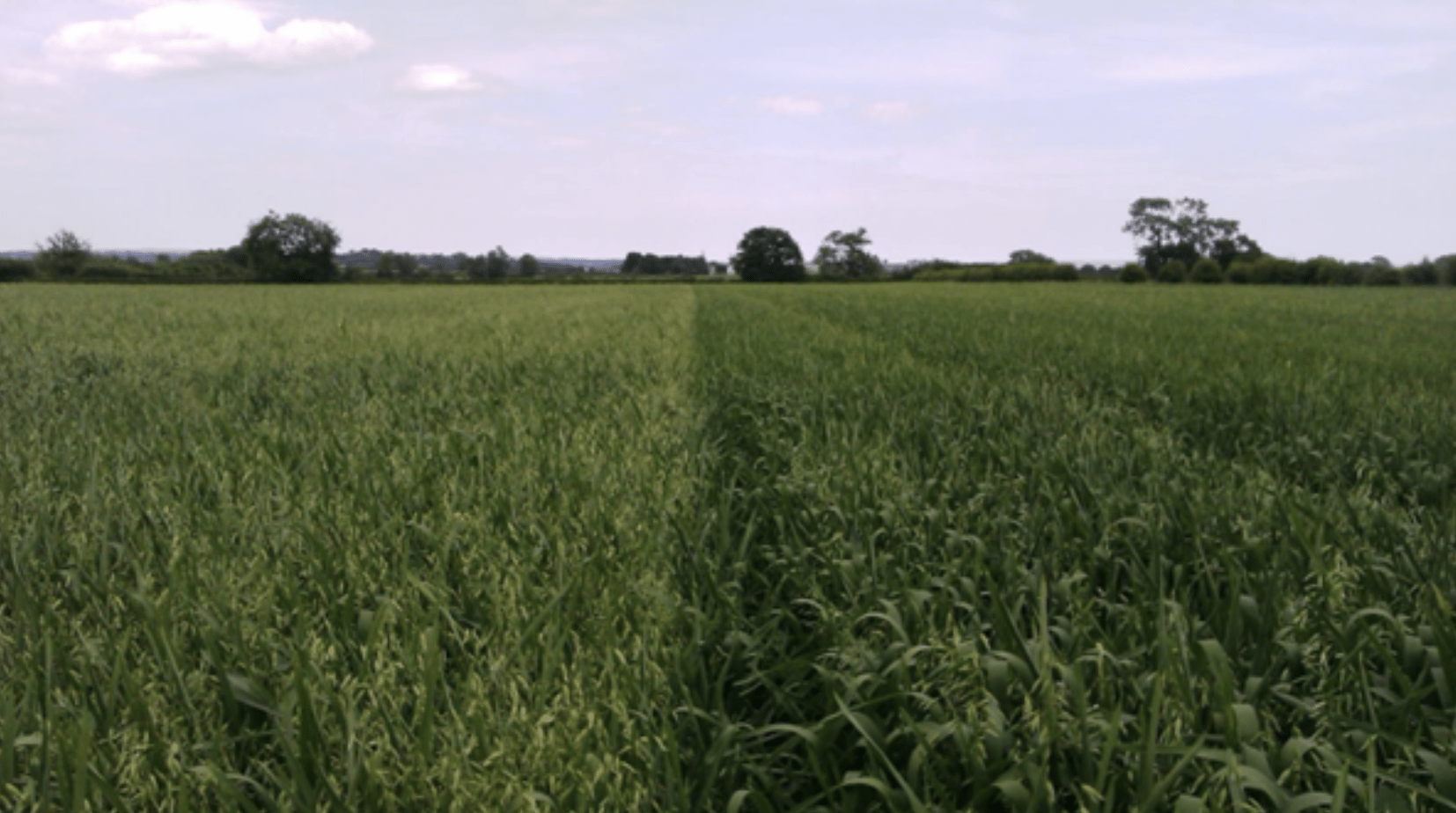

Another Successful DIDIN Trial
The following trial looked at improving nitrogen and protein content within commercial ryegrass. The Ryegrass from the treated areas was cut and sent for analysis for N and Protein content by NIAB. Both results showed a positive increase where DIDIN was included.
A further trial utilising DIDIN on wheat showed an increase in Nitrogen Use Efficiency, utilising a 2 split pass with less fertiliser applied when including DIDIN and NitroShield compared to a standard rate 3 split pass. Reducing the amount of passes travelled on the land, N2O emissions and CO2e emissions.
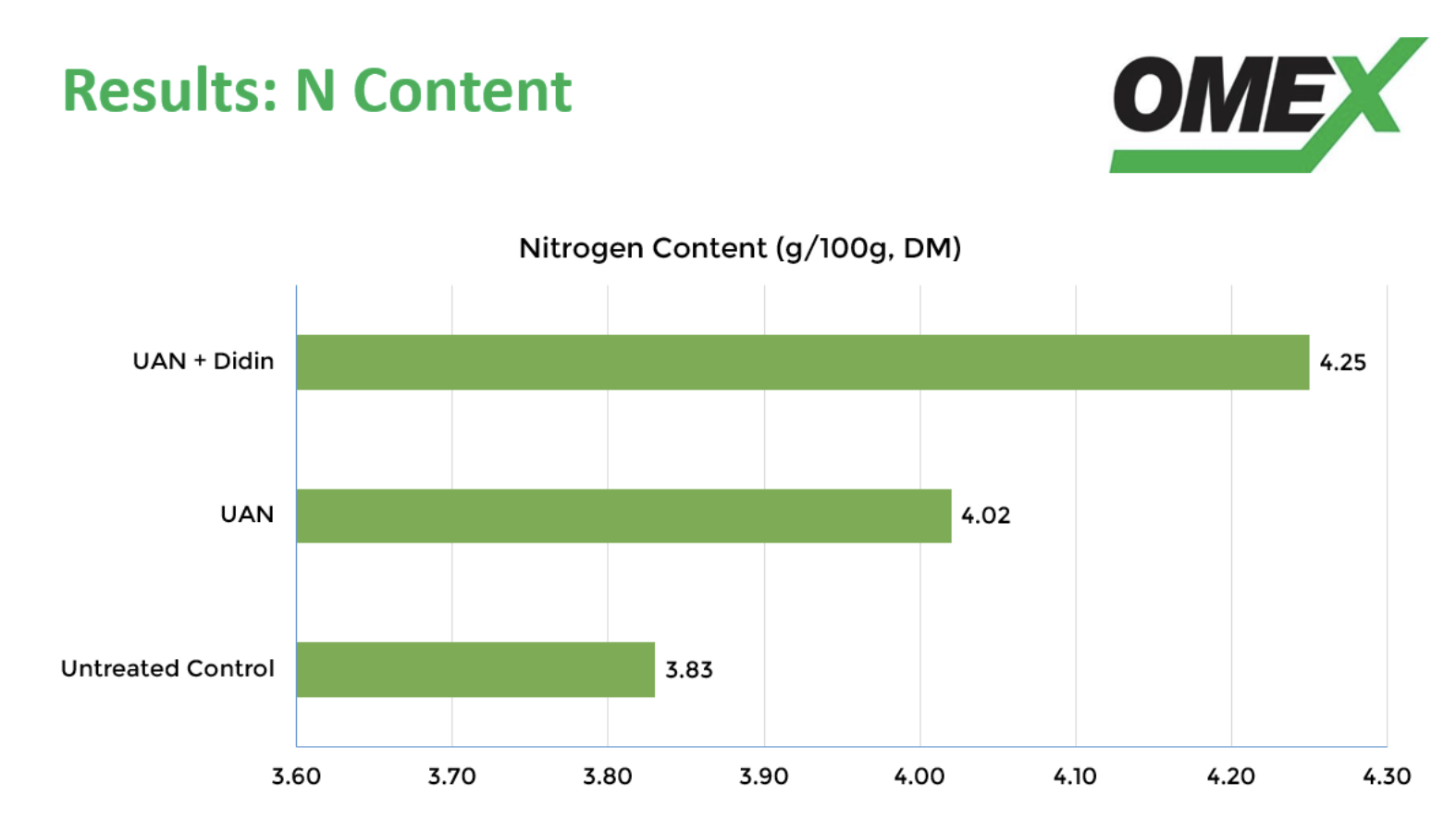
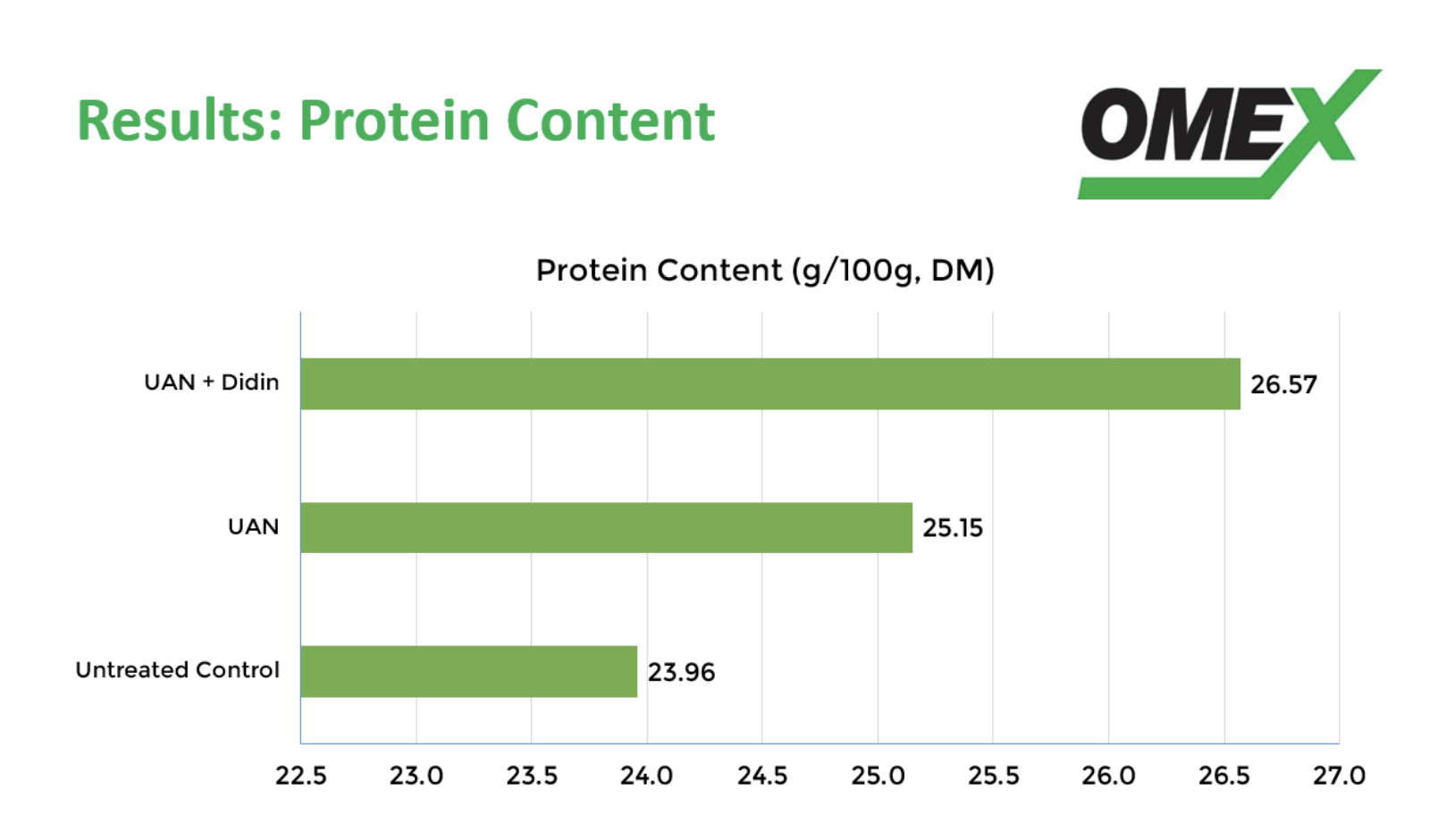
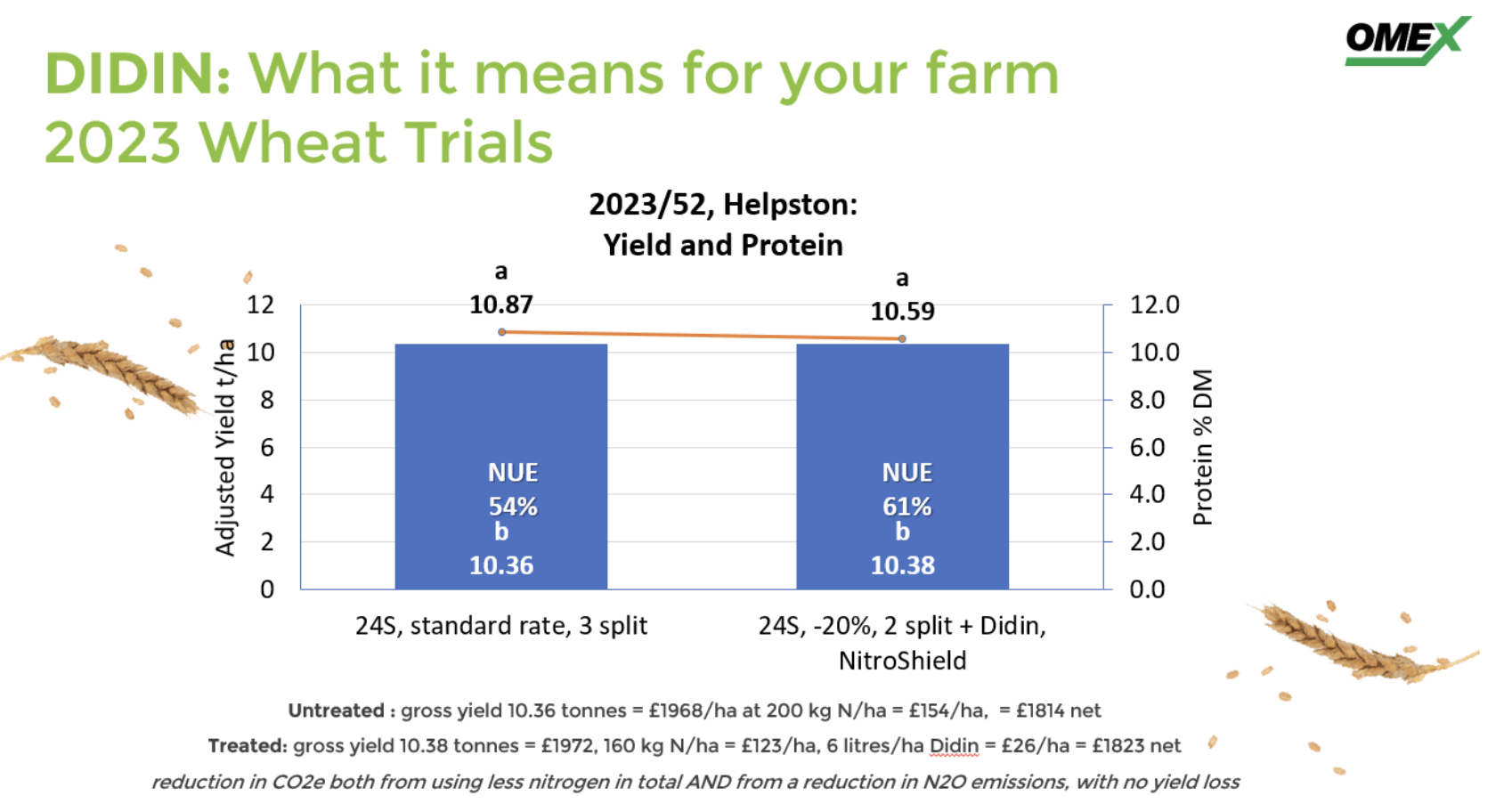
Independent Technical Survey on Inhibiting Climate Change
CPM and OMEX carried out a survey that showed 5% of growers accepted that they ought to do more to reduce their farms’ impact on the environment, while 59% also recognised that nitrate leaching can lead to financial losses on farm.
“There’s no getting away from the conversation about climate change and environmental protection at the moment and I think it’s reassuring to know so many growers have a vested interest in doing more.”
David Booty

-
DIDIN is supplied separately to our bulk fertiliser range in bottles or IBCs. This is to ensure the correct inhibitor is being utilised for the situation, avoiding the unnecessary application of unneeded inputs. It’s mixed with the bulk fertiliser ahead of application.
-
DIDIN can be included in your fertiliser application to reduce the carbon footprint. Arable farmers using DIDIN could be credited with a reduction of around 500 to 700 kg/ha CO2e, according to the amount of nitrogen applied.
-
Utilising DIDIN means the full seasons nitrogen requirement can be applied in one simple pass. The nitrogen is held safely crop available throughout the crops growing cycle, with no damage to soil health. The reduced number of passes reduces soil compaction.
-
DIDIN reduces nitrous oxide emissions of nitrogen fertiliser. It’s been demonstrated to consistently reduce emissions due to retaining the nitrogen in a crop available form for longer.
